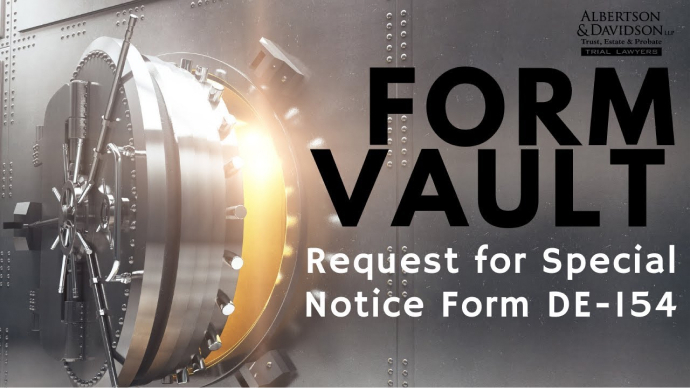Video Transcript
The following is an unedited, verbatim transcript of our video. It is not intended to be a stand-alone article.
Hi, this is Keith Davidson of Albertson & Davidson. In this video, I’m going to cover the Request for Special Notice. This is a filing that you can do in a probate action and it will help ensure that you get noticed in everything that occurs in that probate action. There are times that you may not be legally required to be noticed based on what action somebody’s taking in a probate case. And it could be a probate case like a Will, or it could be a Trust case, anything that is filed in probate court. There are times when you might be entitled to notice, there might be times when you’re not necessarily entitled to notice. But once you file a request for special notice, then you must receive notice of everything that’s filed in that action. So, a lot of time we’ll file this form just to make sure that we get notice of everything.
So we’re going to start by going in Google, to the judicial council forms, and we’re going to go to the California Court website. Once there, we’re going to click on Probate, Decedent’s Estate, and we’re going to go down to Form DE-154, and this is our Request for Special Notice. The nice thing about the request for special notice is it’s easy to file, you just file it in whatever probate action you’re interested in, and once you do that, then you’ll be sure to get notice of everything.
DE-154
So, we’re going to start off by just filling in our information, and if you’re doing this and you don’t have a lawyer, you can just put your name and then out pro per after it, if you are a lawyer then obviously you’ll go ahead and put your bar number in this location, and we’ll put in the firm name as well, and we’ll put in the firm address, and there’s room over here for your telephone and fax number, you always want to do that just to make sure that people can get a hold of you if they need to. And then you’re going to list out the court information. So what court are you in and what is the street address for that court and the mailing address for that court. You need to put in the branch name if you know it, and you can always go on the court’s website and find all these information for whatever court you’re in. And then you’re going to list out the name of the estate you’re dealing with. So, we’re going to use the name Bob Smith, and they want to know if he is Decedent, Conservatee, Minor, or Trust. So Decedent means its a Will case, it has something to do with an estate or an intestate estate. Trust is obviously a trust case, Then Conservatee or a Minor would be a guardianship matter. So, click whatever box is appropriate to you and then make sure you put in the case number. It’s really important that you file this form in the right case number because that hoe the court’s going to know that you require notice. If you file this the wrong case number, nobody will now that you’re entitled to notice.
So then you’ll have to say that either “I am a person interested in this proceeding” or “I am the attorney for a person interested in this proceeding” and you have to specify the name of the interested party. So, you’re not allowed to file a request for special notice if you have no relationship to the Estate or the Trust. You have to have some interest in the proceeding, but for an example, if you’re a creditor of an Estate, you may want to file a request for special notice just to make sure that you know everything that’s being filed and nobody forgets to give you notice, and under some circumstances, a creditor may not be required to be noticed, depending on what the filing is. So this is where you want to fill in your information as to who’s, why they’re entitled to notice. So this would be, whatever person is entitled to notice. So this is the Estate of Bob Smith, so let’s say he has a son by the name of Richard, and so Richards Smith the son wants to make sure that they receive and I, as the attorney I’m filing this on behalf of Richard Smith. And then it wants to know “I Request Special Notice of”, and you can specify what you want special notice of. You can say all matters, so I want all matters for which special notice may be requested, in which case you don’t check any of these other boxes. Or you can say I just want to know when the inventory and appraisal are filed, or I just want to know when an objection to an appraisal is filed, I don’t want anything else. So you can be a little bit picky about what to want to get notice of. You can also select “other”, if there’s something, in particular, you’re on the lookout for and you can specify what that other is. Personally, I wouldn’t check other, you could say all petitions that might be okay, I wouldn’t specify a petition because chances are you might get the name wrong, I think you’re better off saying just give me notice of all matters if that’s what you want.
Sending Notices
Now they want to know under number 3 where do you send these notices. So, send the notices to the interested person at the following address or send it to the attorney for the interested person. So since I’m an attorney, this is what I would fill out and I would ask that everything be sent to me and my law firm, that way when people are giving notice, they know that they have to send an extra copy my way. And then you’re going to put the date and then we’ll go ahead and sign this. You also need to put if since I’m signing this as an attorney, I need to put who’s the client name is so that they know that I’m signing it on behalf of Robert Smith.
On the second page is where we’re going to have our proof of service by mail. You do need to file this form with the court but you also have to serve it on everybody who’s interested in the estate, and so that’s where you’re going to serve it by mail, and you’re going to fill this out just like you do any proof of service, so you, the person who is serving this, you’re going to put your name, you can’t be a party to the action by the way, if you’re serving this. You’ll notice right here you have to be over the age of 18 and not a party to this cause. So you have to either have you, attorney, serve it or you can hire an attorney service to serve it, something like that. So I would put my name and put my address, this is the business address from which the proof of service will be mailed.
Number 3, I have to say whether I’m going to deposit directly into a post office box or I’m going to place it into my firm’s ordinary business practice for mailing. And then I’m going to put the date that it’s deposited into the mail, and we’re going to put the place where it was mailed, and then you’re going to date and sign it. Again, you’re signing this under penalty or perjury so every, all the information above has to be correct. And you’re going to put in the name and address for each person that you serve. We typically will click this box and just attach it in a separate attachment, cause it’s a little easier to type the names and addresses in a word document, a separate word document, although up here, I typically would say “See Attached” so that everybody is clear that there’s an attachment with the names and addresses on it.
Down here, you can also have the personal representative admit service so that they can accept service and say that I acknowledged and received this, and in that way, everybody knows that the personal rep has this information.
Once you fill this out, you’ll mail it and then the form itself will be filed with the court, and that way, the court will know that you must get special notice, you must get a copy and notice of all filing that are going to happen in that probate matter moving forward.




